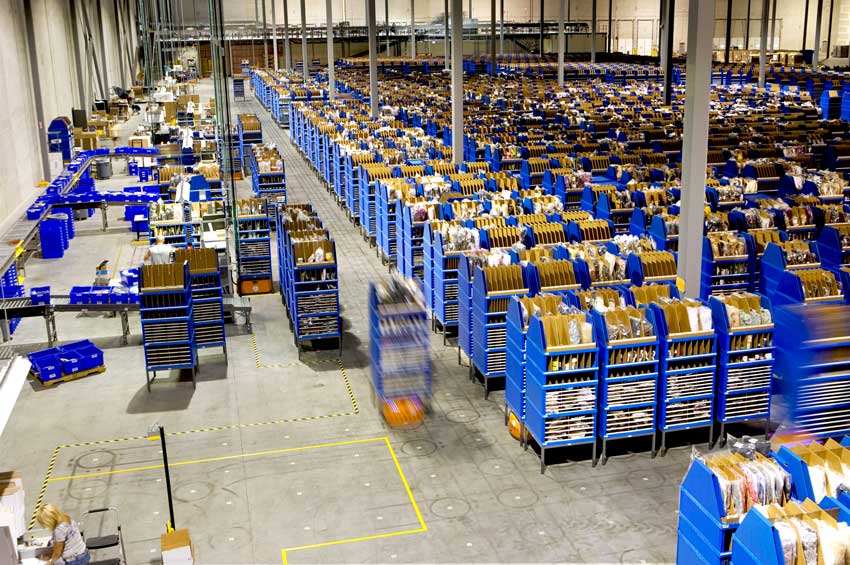
Robohub.org
The robots behind your Internet shopping addiction: How your wallet is driving retail automation

When you’re shopping for the best online deals you’re probably not thinking much about the massive distribution network required to bring that pair of shoes to your doorstep. Is your quest for the best possible deal helping to usher in the next wave of automation?
Internet giants like Amazon and Google have an obligation to stay competitive and are going head-to-head over the online shopping space. Customers choose to purchase the lowest priced product, without loyalty to any online e-tailer, and expect fast shipping and handling. Amazon and Google appear to have two strategies for staying competitive: improving their search experience and decreasing inefficiencies in their supply chain. For the latter strategy, both companies have publicized their interest in robotics – and have invested heavily.
The manufacturing sector has relied on robotics and automation for several decades. In many sectors, productivity has increased while employment levels diverged, leading many people to assume “robots kill jobs.” Technology has been displacing workers for the past century, but I have not heard of a customer who has voluntarily purchased a more expensive product in order to reward a company for their inefficient operations. Robotics and automation are the link between data and the physical world, and automation technology is required for the production of complex products, but the hypocrisy between “having our cake, and eating it too” has put robot companies in an awkward position: automation has advanced the human race with wonderful products, but many people say they would rather throw that productivity away in order to keep their jobs.
Humans live in a physical world: we touch, hold, and eat physical things – so society needs to accept that as long as we demand inexpensive goods and services, companies will choose to automate a process the moment a technology becomes available. This strive for efficiency is constant, ongoing, and cannot be stopped – even if jobs are displaced in the process.
New robotics companies are finding it difficult to attract investors – especially if their robot can’t be put under a Christmas tree. The online storefronts that Silicon Valley investors have fallen for are subject to market commoditization, and the only way to compete is to make the physical world, production and distribution, more efficient. Due to rising wages and physical limitations on the human body, this cannot be achieved with pure manual labor. In my experience, investors have noticed Amazon’s acquisition of Kiva Systems and are beginning to realize that the backbone of internet shopping lies with automating factories and warehouses.

According to a recent New York Times article: “Google’s robotics effort is not something aimed at consumers. Instead, the company’s expected targets are in manufacturing — like electronics assembly, which is now largely manual — and competing with companies like Amazon in retailing, according to several people with specific knowledge of the project.” In fact, Google just announced a partnership with Foxconn for electronics assembly.
Fuel and labor costs are having a direct effect on Amazon Prime’s pricing, and Amazon announced a rise in prices that provoked a negative reaction by shareholders. I stretch to suggest a large percentage of customers who enjoy Amazon Prime’s free or inexpensive shipping also complain about robots taking jobs – a counter-productive opinion for a society that wants lower priced products but cannot accept the employment ramifications.
Amazon and Google are in competition and both will use robots for a more efficient supply chain. All companies will automate processes when the appropriate technology becomes available. Technical improvements are constantly sought after, manual labor is not, so companies will always demand robots as an alternative to having a less efficient workforce. Folks who choose to educate themselves and gain the necessary skills will always find a job. My wish for all people is they get to spend their lives instigating the projects they find most meaningful and do what people (not robots) are best at: imagining a better world, designing the future, and making amazing things happen.
Perhaps when Google and Amazon has elimiated shipping and handling costs, we can find some room in our wallet to donate $1 of every internet purchase back to our education system.
If you liked this post, you may also be interested in:
- Big deals: What it means to have the giants investing in robotics
- 7 consumer robots to look out for from CES 2014
- The economic impact of the robotic revolution
- The death of search (or, My dysfunctional relationship with Siri)
- Foxconn and Google cooperating to make robots
See all the latest robotics news on Robohub, or sign up for our weekly newsletter.
tags: Amazon, c-Business-Finance, cx-Politics-Law-Society, FOXCONN, Google, Industrial Automation, Kiva, robohub focus on big deals





